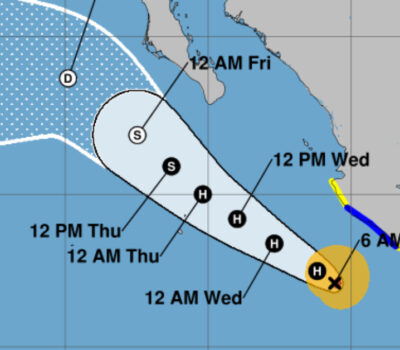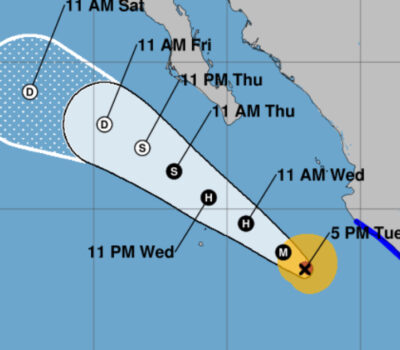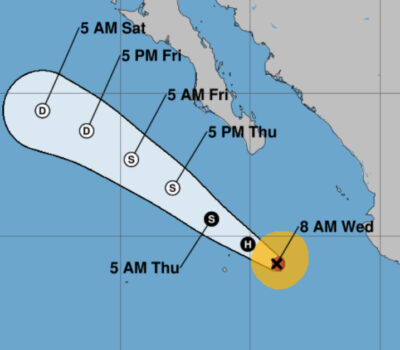Mexico is preparing to authorize the export of farm-raised totoaba fish to international markets, aiming to combat illegal trafficking and promote sustainable aquaculture in the Sea of Cortez.
In the clear waters off San Juan de la Costa, Baja California Sur, a boat cuts across the surface of the Sea of Cortez on a four-kilometer journey to one of Mexico’s most unique and closely guarded marine projects—the country’s only private totoaba nursery.
There, in the deep blue, biologists, veterinarians, and divers from the Santomar company oversee a high-tech underwater aquaculture system that could soon put Mexican totoaba fish on dinner tables abroad for the first time.
Totoaba, a large fish endemic to the Sea of Cortez, has long been at the center of international controversy due to illegal poaching driven by demand for its prized swim bladder, especially in Asian markets. Now, Mexican authorities are betting on legal, traceable, and sustainable farming to curb trafficking while tapping into lucrative international markets.
Sustainable aquaculture in motion
The Santomar hatchery operates seven submersible cultivation areas, each capable of housing up to 40,000 totoabas in a dark, cold environment that mimics natural conditions. A team of five divers, supported by technical staff, manages and harvests up to six tons of totoaba weekly.
These operations fall under a tightly regulated Wildlife Conservation Management Unit (UMA) system. Along with Santomar, the Universidad Autónoma de Baja California (UABC) in Ensenada and the Marine Species Reproduction Center of Sonora are the only other facilities authorized for totoaba aquaculture under Mexican law.
Santomar holds the Best Aquaculture Practices certification, confirming its high standards in animal welfare, feed quality, and environmental management. From larval development at Pichilingue port to offshore rearing, every stage is controlled, traceable, and sustainable.
From domestic tables to international markets
Currently, farm-raised totoaba is only legal for domestic sale. However, that’s about to change. A reform to the General Import and Export Tax Law—already approved by the Mexican Senate—now awaits enactment by President Claudia Sheinbaum. Once published in the Official Gazette, it will permit international exports of farmed totoaba.
“In order to maintain equity for domestic products whose value abroad can fetch higher sales prices, the aim is to eliminate the prohibition on their export and establish, accordingly, the codes, descriptions, and quotas for imports and exports,” the reform states.
Crucially, the law enshrines a permanent ban on the export of wild totoaba, reaffirming protections for this endangered species under NOM-059-SEMARNAT-2010. Only farmed fish—raised under controlled and certified conditions—can enter legal trade.
Marina Robles, Undersecretary of Biodiversity at Semarnat, calls this “a great achievement,” highlighting that farmed totoaba helps protect the species while meeting international demand for traceable seafood.
A new global fish on the market
Pablo Konietzko, CEO of Santomar, is already laying the groundwork for global promotion. With plans for marketing campaigns and collaborations with renowned Mexican chefs, he hopes totoaba will soon become a recognized premium product abroad.
“It took us many years to make the totoaba known in Mexico,” Konietzko said. “Now it’s going to take a lot of effort to make it known in other parts of the world. But there’s a global deficit in sustainable and traceable seafood. That’s where totoaba can shine.”
His first target? England. Konietzko believes totoaba’s firm, flavorful meat is perfect for the UK’s beloved dish—fish and chips. With the UK facing a €2.6 billion deficit in white fish imports, he sees a prime opportunity.
“We’re targeting European countries that value quality fish. If we can trim even a bit of that deficit, we’ll be very well off,” he said. “Just like tequila and mezcal represent Mexico abroad, the totoaba will become an ambassador of the Sea of Cortez.”
Science-backed and conservation-minded
Santomar’s process begins with eggs hatched in Pichilingue. After a 30-day larval phase, the young fish grow in pre-fattening tanks before being moved offshore in large containers. Once they reach around three kilos, they are ready for harvest.
Health is a top priority. The offshore team uses underwater robots to monitor fish welfare, and veterinarians like Luis Jaimes ensure high standards are met throughout. “We care for the fish not just for market value, but as a way of protecting the species,” Jaimes says.
Production manager Cristian Saldias adds: “These fish are raised with great care and concern for animal welfare. Diners can be confident they’re consuming a healthy, delicious, and ethically produced product.”
Releasing hope back into the sea
Beyond commerce, Santomar is also committed to conservation. This year marks the 10th anniversary of its totoaba release program. So far, 270,000 fish have been returned to the wild—including 40,000 hatchlings released this year at Santispac Beach in Mulegé.
“I didn’t know the totoaba was endangered,” said Irlanda Elizabeth, who participated in the release with her friend Alma Luz. “It’s an experience worth sharing because you’re contributing to repopulation. You can be part of the change.”
Fernando Gual, Director General of Wildlife at Semarnat, calls the release program a form of conservation that involves and educates the community. “These activities not only help restore the species, but they also create awareness. What better place to do this than in the Gulf of California, a biodiversity hotspot where totoaba is symbolic?”
A cautious but hopeful future
While the export authorization is pending final approval, the pieces are in place for totoaba to enter the international market as a sustainable, high-value seafood product. For advocates like Konietzko, it’s a chance to transform a once-threatened species into a national icon—while helping fight illegal trade through legal, traceable alternatives.
Whether grilled in a high-end restaurant or served alongside fries in a London pub, the future of totoaba now hinges on balancing commerce, conservation, and culinary appeal. If successful, it could mark a turning point not just for the fish—but for the future of sustainable aquaculture in Mexico.
Mexico is preparing to authorize the export of farm-raised totoaba fish to international markets, aiming to combat illegal trafficking and promote . . .












